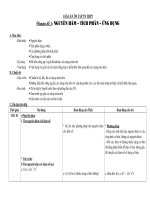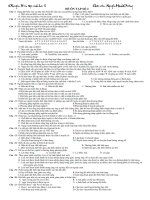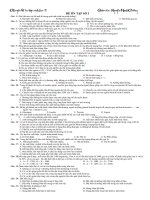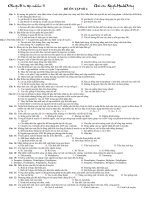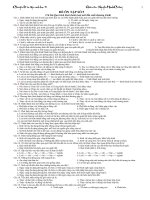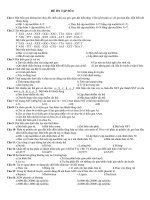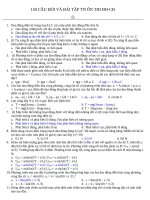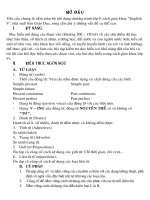On tap TN (BGD).doc
Bạn đang xem bản rút gọn của tài liệu. Xem và tải ngay bản đầy đủ của tài liệu tại đây (106.92 KB, 23 trang )
MỞ ĐẦU
Yêu cầu chung là nắm toàn bộ nội dung chương trình lớp 9, sách giáo khoa “English
9”, nhà xuất bản Giáo Dục, song cần chú ý những vấn đề cụ thể sau:
I. KỸ NĂNG
Đọc hiểu nội dung các đoạn văn (khoảng 100 – 150 từ) về các chủ điểm đã học
như: bản thân, sở thích cá nhân, trường học, đất nước và con người nước Anh, tiểu sử
một số nhà văn, nhà khoa học nổi tiếng, vô tuyến truyền hình (vai trò và ảnh hưởng),
thể thao, giải trí….và làm các bài tập kiểm tra đọc hiểu (có khả năng đặt câu hỏi và
trả lời câu hỏi đọc hiểu theo các đoạn văn, các bài đọc hiểu trong sách giáo khoa lớp
9).
II. KIẾN THỨC NGÔN NGỮ
A. TỪ LOẠI
1. Động từ (verbs)
- Thời của động từ: Yêu cầu nắm được dạng và cách dùng của các thời:
Simple present Simple past
Simple future
Present continuous Past continuous
Present perfect Past perfect
- Dạng bò động (passive voice) của động từ với các thời trên.
- Dạng V – ING của động từ, động từ NGUYÊN THỂ có và không có
“TO”.
2. Danh từ (Nouns)
Danh từ số ít, số nhiều, danh từ đếm được và không đếm được.
3. Tính từ (Adjectives)
So sánh tính từ
4. Trạng từ (Adverbs)
So sánh trạng từ.
5. Giới từ (Prepositions)
Ôn tập và củng cố cách sử dụng các giới từ: Chỉ thời gian, chỉ vò trí….
6. Liên từ (Conjunctions):
Ôn tập và củng cố cách sử dụng các loại liên từ.
B. CÚ PHÁP
1. Ôn tập củng cố và nắm vững các câu đơn cơ bản với các dạng tường thuật, phủ
đònh và nghi vấn, đặc biệt trật tự từ trong các loại câu.
2. Củng cố để nắm vững cách sử dụng các câu phức với các từ nối (liên từ)
3. Nắm vững cách sử dụng câu điều kiện loại I và II.
III. CẤU TRÚC CỦA ĐỀ BÀI THI VIẾT
1. Kiến thức ngôn ngữ (chọn trong các dạng sau)
- Put in the correct tense of the verbs in brackets.
- Fill in the blank with correct prepositions/ word forms.
- Choose the best option to complete each sentence.
- Complete the sentences with the words provided.
- Complete the sentences in a suitable way.
- Join/ combine sentences.
- Sentence transformation/ Rewrite the sentences.
2. Đọc hiểu (chọn trong các dạng sau)
Read a passage (100 – 150 words) and to the exercises.
Cloze reading.
CÁC DẠNG BÀI TẬP CƠ BẢN
Question I. Put in the correct tense of the verbs in brackets.
A. Use the simple past or the past continuous/ progressive tense:
1. – When he (leave) Hanoi for Ho Chi Minh City?
- He (leave) yesterday morning.
2. They (start) to learn English when they (be) only 10 years old.
3. She (play) the piano when we (arrive).
4. – What you (do) at 8 o’clock yesterday when he (come to) to see you?
- Oh, I (write) a letter to my eldest brother.
5. They still (sleep) when their father (come) back from work.
6. She (come) into the room, (open) the window, (turn) on the light, and (begin) to
read a newspaper.
7. It (rain) hard when they (be) on their way home. As they (have) no raincoats with
them, they (be) wet through.
8. Her mother (cook) in the kitchen while her father (clean) the sitting – room.
9. When I (come) to her house, she (work) in the garden. She (tell) me that she
usually (do) the gardening when she (have)free time.
10. It (be) 2 a.m. Elisa (wake) up. She (look). It (snow).
B.Use the simple present, the present continuous/ progressive tense, the
simple past or past continuous/ progressive tense.
1. We often (drink) coffee in the morning. But yesterday morning we (drink) tea.
2. On my way home I often (meet) many children who (go) to school.
3. The sun (rise) in the east and (set) in the west.
4. – When they (finish) their work?
- They (finish) it two hours ago.
5. – What she still (do) when her mother (go) to bed last night?
- She till (write) an essay on the Thames.
6. – What you (do) now?
- We (repair) our house. We (hope) everything (be) nice.
7. He often (buy) presents for his daughter on her birthday.
Yesterday (be) her 15
th
birthday. He (buy) her a big doll.
8. He (begin) to learn foreign languages when he (be) quite young.
9. People (know) that Columbus (discover) America nearly 500 years ago.
10. They all (believe) that he just (come) back from London last week.
C. Use the simple past or the present perfect tense .
1. They just (decide) to buy a new house.
2. “Gone With the Wind” is the most interesting film we (see) recently.
3. – You (see) Nam last Sunday?
- Oh, no. I (not to see) him for many days now.
4. – Since when you (learn) English?
- I (learn) it since I (be) a girl of twelve.
5. – You ever (be) to Ho Chi Minh City?
- No, I (not to be) there yet. But my parents (be) there twice this year.
6. They (do) nothing since they (get) up.
7. My brother (join) the army when he (be) 18. He (serve) in the army for 3 years
and then (go) to university.
8. – How long you (live) in this town?
- I (live) in this town for ten years.
9. My sister (finish) school in 1997 and (be) a student at the National University since
then.
10. Have you some more rice?
- No. Thanks. I (eat).
D. Use the simple past or past perfect tense
1. What you (do) there before you (return) home?
2. When I (come) to his house yesterday, his mother (tell) me that he (go) to the
cinema with his friend two hours before.
3. He (go) to England after he (study) English for two years.
4. Before they (go) very far, they (find) that they (lose) their way.
5. When their father (get) home from work, they (tell) him that they already (cook)
the dinner.
6. By the time he (return) home from England, they already (build) a new house for
him.
7. When Peter (arrive) at the cinema, the film already (start).
8. The boy (say) that he (do) all his homework before he (go) to bed.
9. The children (begin) to do the exercise after they (review) all the rules.
10. He (make) a report on the history of England after he (read) a lot of books about
it.
E. Use the simple present or simple future tense.
1. He (learn) French when he (have) time.
2. They (not to go) on working until the rain (stop).
3. I (not to do) it until they (tell) me to.
4. They (come) to see their grandparents before they (leave) for New York.
5. She (learn) one more foreign language when she (go ) to university.
6. They (not to go) home until it (stop) raining.
7. – Where you (be) at this time tomorrow?
I (be) at the meeting.
8. Nobody (know) what he (do) to earn his living after he (finish) school.
9. – When we (meet) again?
- We (meet) again when I (return) home from Australia.
10. He (be) busy at the moment. But he (come) to give you a helping hand as soon as
he (finish) his work.
F. Use an appropriate tense for the verbs in brackets.
1. We still (do) our work now. But we (go) with you right after we (finish) it.
2. He (get) off the train and (go) straight home. But he soon (realize) he (leave) his
umbrella on the train.
3. My brother (decide) that he (buy) a motorbike next year.
4. He (be) good to me since I (be) a little girl. I (hope) I (not to forger) his kindness.
5. Mrs. Huong (be) a teacher of English for 27 years. She first (start) teaching English
at a small school. After she (teach) there for ten years, her family (move) to a big
city. Since then she (be) a teacher at a big school there.
6. They still (live) in a small house now. But they (move) to a big building as soon as
they (finish) repairing it.
7. – What you (do) at this moment?
- I (write) a report.
- When you (finish) it?
- I (think) I (finish) it in ten minutes.
8. – Since when you (work) at this factory?
- I (work) at this factory since I (be) very young.
9. – How long they (be) here?
I (not to know) exactly. Maybe, they (be) here since 7 o’clock.
10. He (come) into the study, (stare) at me and (leave) without saying a word.
Question II. Choose the best option to complete each sentence.
1. He is an excellent teacher. He has a lot of…………………………...
a. experiences b. languages c. problems d. periodicals
2. Nam is a good student. He will be…………………… is future.
a. beautiful b. careful c. successful d. awful
3. She is in the………………..of getting up early in the morning.
a. breakfast b. habit c. food d. exercise
4. I have just showed my…………………….to the librarian.
a. subject card b. title card c. library card d. author card
5. I have…………………..a letter to my friend.
a. posted b. issued c. collected d. published
6. …………………..breakfast yet?
a. Had you had b. Have you had c. Have d. Had
7. He …………………………a class report on rubber trees at the moment.
a. gives b. giving c. is giving d. was giving
8. Jack…………………..a lot of stamps last year.
a. collected b. has collected c. had collected d. is collected
9. A dictionary……………………………..for reference.
a. used b. uses c. are used d. is used
10. The teaching staff………………….a meeting now.
a. is having b. are having c. has d. have
11. This table was made………………………..wood.
a. from b. in c. by d. of
12. You shouldn’t laugh…………………….those disabled children.
a. with b. at c. of d. to
13. She advised me…………………………after dark.
a. not go out b. don’t go out c. didn’t go out d. not to go out
14. He earned his living by…………………..as a tailor.
a. work b. worked c. to work d. working
15. There are…………………….people in the lecture hall.
a. many b. a lot c. much d. little
16. ………………………to walk from here to the beach?
a. How long does it take b. How far does it take
c. How much does it take d. How many does it take
17. She is a famous singer. She sings………………………….
a. beautifully b. beautiful c. very good d. very nice
18. Which one is………………………, coffee or milk?
a. good b. better c. the best d. well
19. She was………………….busy to go to the party.
a. enough b. so c. too d. very
20. He wasn’t experienced………………….. a good job.
a. enough to do b. enough do c.
enough doing d. enough to be done
21. You…………………… better be careful not to miss the train.
a. should b. would c. had d. did
22. He didn’t get up………………….. 9 o’clock.
a. until b. since c. for d. on
23. Are you interesting in……………………… to classical music?
a. listen b. listening c. listened d. are listening
24. There is………………….. in today’s paper.
a. a lot of good news b. many good news
c. some good news d. a few good news.
25. …………………………do you go to school every day? By bus.
a. When b. How c. Why d. Where
26. A football match is………………into two equal parts of forty- five minutes each.
a. decided b. divided c. invited d. visited
27. Football is………………………………in Vietnam.
a. popular b. polluted c. famous d. friendly
28. The Olympic Games take place……………………..in a different country.
a. every year b. every two years
c. every three years d. every four years
29. Athletes…………………….to win in the Olympic Games.
a. do their best b. try their best
c. make their efforts d. a, b and c are correct
30. Up to now I……………………………… 90 pages.
a. am reading b. had read c. was reading d. have read
31. I hope you…………………….. successful in future.
a. will b. are c. will be d. are going to
32. Where can you find some reference books…………………the subject?
a. in b. for c. with d. on
33. If I were him, I would………………………..them the truth.
a. say b. tell c. speak d. ask
34. John works…………………………..than Tom.
a. hardly b. hard c. more hardly d. harder
35. It was……………………all of us bought it.
a. so good novel that b. such a good novel that
c. so a good novel that d. such a novel good that
36. Helen and Mary usually help……………………….
a. each other b. one another c. other d. otherwise
37. Can you explain the difference………………….these two words?
a. from b. two c. of d. between
38. Are you ready? No, I’m not and………………………………..
a. She isn’t too b. neither is she
c. so is she d. she is not
39. May I watch the game…………………..we are having dinner?
a. during b. between c. while d. just
40. I have typed ten letter…………………………….
a. every day b. yesterday c. today d. nowadays
41. The mother looked………………………………..at her naughty boy.
a. angry b. angrily c. angerd. angered
42. When can we start? Oh, it depends………………………….yourself.
a. at b. to c. on d. from
43. She is looking………………………..her sick mother.
a. on b. after c. like d. out
44. He refused……………………………in the game because he was busy.
a. participate b. participating c. to participate d. participated
45. She is bored with…………………….with that man.
a. chat b. chatting c. to chat d. is chatting
46. This journalist is famous………………………his sports reports.
a. by b. for c. of d. from
47. My aunt and uncle are living………………………………the sea.
a. at b. on c. in d. by
48. If you want…………………………, you should take more exercise.
a. healthy b. to be healthy c. be healthy d. healthiest
Question III. Complete the sentences using the correct form of the
words in brackets.
Ex: My mother is a……………….of English. (TEACH)
My mother is a teacher of English.
1. He is a famous……………………. (ACT)
2. Her father is a…………………….. (FARM)
3.She sent her best wishes for my future………… (HAPPY)
4. …………………are trying to find out new stars. (SCIENCE)
5.We are very proud of our…………………….. (FRIEND)
6. These articles were written by a good……………….. (REPORT)
7.He was punished for his………………….. (LAZY)
8.This…………has written many stories for children. (WRITE)
9. He will never forget his happy……………. (CHILD)
10. This is the biggest……………..in the city. (BUILD)
11. Peter is an ……………………member of our club. (ACT)
12. We like going in his car as he is a………driver.(CARE)
13.AIDS is a……………….disease. (DANGER)
14. Do you often read…………….newspapers? (DAY)
15.They are watching an…………Football match on TV. (EXCITE)
16. She is……………….of doing the same things every day. (TIRE)
17.What do you usually do on…………….days? (SUN)
18. These are………………..toys for children. (USE)
19. She looks……………….in her new coat. (ATTRACT)
20. He turns out to be the………..student in his class. (GOOD)
Question IV. Join the sentences using the provided word in brackets
1. He was very busy. He came to see us. (ALTHOUGH)
2. He didn’t learn his lesson. He got a bad mark. (BECAUSE)
3. He works very hard at English. He often gets good mark in it. (SO)
4. The book was very interesting. He read it from cover to cover. (SO…THAT)
5. He didn’t go to the meeting. He was ill. (SINCE)
6. It was a hard exercises. We couldn’t do it. (SUCH…THAT)
7. She is clever. She can do everything by herself. (ENOUGH)
8. The play was short. They enjoyed it. (HOWEVER)
9. He is clever. He is hard – working, too. (NOT ONLY… BUT ALSO)
Question V. Finish each of the following sentences in such a way that it is
as similar as possible in meaning to the original sentences.
1. My kitchen is smaller than yours.
Your kitchen………………………………………………………….
2. They will change the date of the meeting again.
The date…………………………………………………………………
3. The children liked to walk in the rain.
The children enjoyed……………………………………………..
4. My grandmother is very old. She can’t work now.
My grandmother is too……………………………………………
5. The children couldn’t go swimming because the sea was rough.
The sea was too………………………………………………………
6. The question was so difficult that no one could answer it.
It was such………………………………………………………………….
7. They will hold an international conference in Hanoi next month.
An international conference………………………………
8. She hasn’t finish the letter yet.
The letter………………………………………………………………….
9. He thinks learning English is easy.
He thinks it is……………………………………………………………
10. Who does this bicycle belong to?
Whose………………………………………………………………………….?
11. Hung is taller than Ba.
Ba…………………………………………………………………………………….
12. His parents advised him to study hard for his exams.
He was…………………………………………………………………………..
13. They have just stolen his car.
His car……………………………………………………………………………
14. The car is too expensive for him to buy.
He hasn’t……………………………………………………………………….
15. We learned this after a long time.
